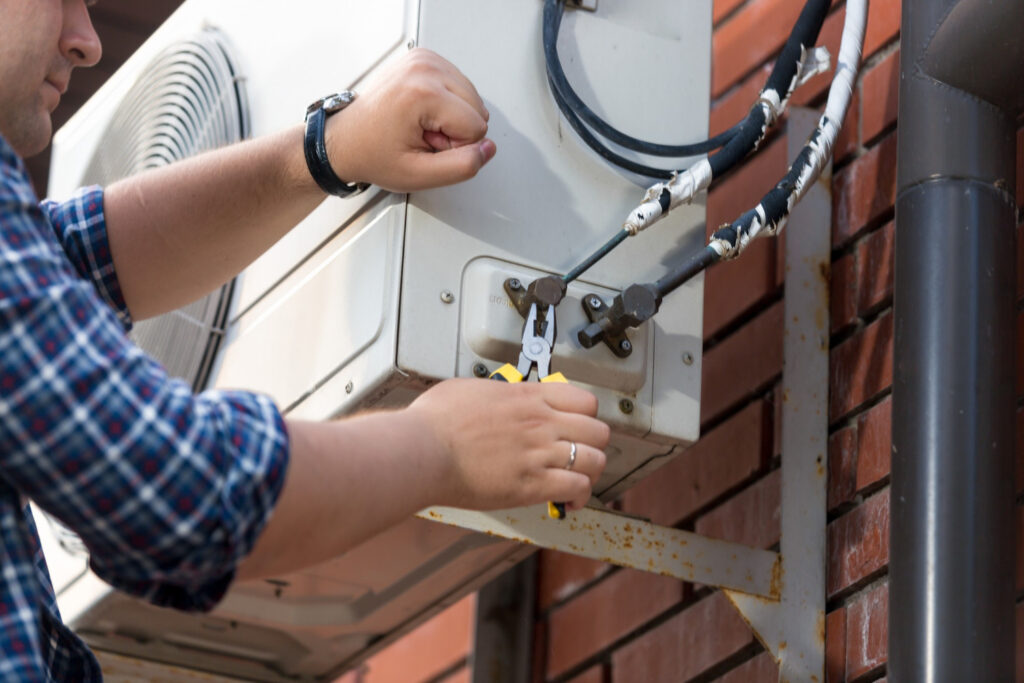Many homeowners rely on heat pumps for efficient heating and cooling throughout the year. These systems offer an excellent balance of performance and energy savings, ensuring your home remains comfortable no matter the season. However, even the most dependable heat pump can face issues over time. One of the most common problems is refrigerant leaks, which can significantly impact the performance of your system.
Refrigerant is vital for your heat pump’s ability to transfer heat. If there’s a leak, it affects the system’s efficiency, driving up energy costs and reducing comfort levels in your home. Recognizing the signs of a refrigerant leak early is crucial for preventing further damage and costly repairs. In Cypress, where temperature control is key, knowing what to look out for can save you from discomfort and unexpected expenses.
Common Signs of Refrigerant Leaks in Heat Pumps
Spotting the early signs of a refrigerant leak can help maintain your heat pump’s efficiency and prolong its lifespan. Here are some indicators to be aware of:
– Unusual Noises: If you hear a hissing or bubbling sound coming from your heat pump, it might indicate a refrigerant leak. These noises occur when refrigerant escapes from the system.
– Reduced Heating or Cooling Efficiency: When the refrigerant level is low, your heat pump struggles to heat or cool your home effectively. You may notice it takes longer to reach desired temperatures or that rooms are unevenly heated or cooled.
– Ice Formation on the System: Low refrigerant levels can cause the coils or refrigerant line to freeze. If you see ice accumulation, it’s a strong indication that the refrigerant is leaking.
– Higher-than-normal Energy Bills: A heat pump working harder to maintain the right temperature can cause your energy bills to spike. If you notice a sudden increase without a change in usage habits, a refrigerant leak might be the cause.
Understanding these signs equips you to take prompt action. Addressing leaks quickly not only prevents further damage but also maintains comfort levels and energy efficiency in your home. It’s essential to reach out to professionals as soon as these signs appear, ensuring your heat pump gets the attention it needs.
Causes of Refrigerant Leaks in Heat Pumps
Refrigerant leaks in heat pumps can arise from several underlying causes, each impacting the efficiency and longevity of your system. Understanding these causes can help you spot potential problems early and seek necessary repairs.
1. Normal Wear and Tear: Over time, heat pumps are subjected to regular wear, which can weaken seals and joints, causing leaks. Keeping an eye on these components ensures that age-related damage doesn’t go unnoticed.
2. Corrosion: The metal parts of a heat pump can corrode, especially in humid environments, leading to points where refrigerant escapes. Regular inspections can prevent corrosion from becoming a significant issue.
3. Installation and Repair Mistakes: If a heat pump isn’t installed correctly, or if previous repairs were inadequate, these can cause refrigerant leaks. Ensuring that installations and repairs are done by skilled professionals prevents these errors.
4. Physical Damage: Any impact or physical damage to the refrigerant lines can lead to leaks. This can occur due to accidents or debris, highlighting the importance of maintaining clear surroundings around your heat pump unit.
The Impact of Ignoring Refrigerant Leaks
Refrigerant leaks should not be overlooked, as they cause numerous complications. Ignoring the problem can severely damage your heat pump, as the system strains to function with insufficient refrigerant. This not only reduces its heating and cooling capabilities but can also escalate to a complete breakdown, necessitating costly replacements.
Moreover, running a heat pump with a refrigerant leak significantly spikes energy consumption, leading to higher utility bills. The energy inefficiency caused by a leak means your system works harder than necessary, translating into increased operational costs over time.
There’s also an environmental concern. Refrigerants can harm the environment, contributing to depletion of the ozone layer. Leaks should be addressed immediately to minimize ecological impact and fulfill environmental responsibility.
Steps to Take if You Suspect a Refrigerant Leak
If you notice signs of a refrigerant leak, it’s crucial to act quickly to minimize damage and restore efficiency. Here’s what you can do:
– Turn Off the System: If you suspect a leak, switch off your heat pump to prevent further damage.
– Contact Professionals: Reach out to our technicians to assess and repair the leak swiftly.
– Professional Diagnosis and Repair: Our professionals will diagnose the leak, locate its source, and conduct necessary repairs to ensure your system performs optimally.
– Regular Maintenance Agreement: Commit to regular maintenance checks to spot potential issues early and prevent leaks from developing.
Ensuring Year-Round Comfort in Cypress
Keeping your home comfortable all year involves more than just addressing issues as they arise. Regular maintenance is a proactive approach that helps identify potential refrigerant leaks before they become serious problems. With routine checks, our professionals can ensure that your heat pump remains in peak condition, providing efficient temperature control throughout the year.
Residents in Cypress can benefit from our professional HVAC services, which are designed to facilitate comprehensive inspections, repairs, and replacements. Investing in regular care not only improves the lifespan of your heat pump but also maintains its energy efficiency, resulting in consistent savings on energy bills. Don’t let a small issue disrupt your home’s comfort and efficiency. Reach out to trusted HVAC experts when you notice any signs of a problem.
If you notice your heat pump isn’t performing as it once did, you might be ready for a heat pump replacement in Cypress that can restore your home’s comfort and efficiency. Whether you see signs of refrigerant leaks or experience reduced performance, addressing the issue quickly makes all the difference. For a quick estimate or to book a service visit, please contact us today.





